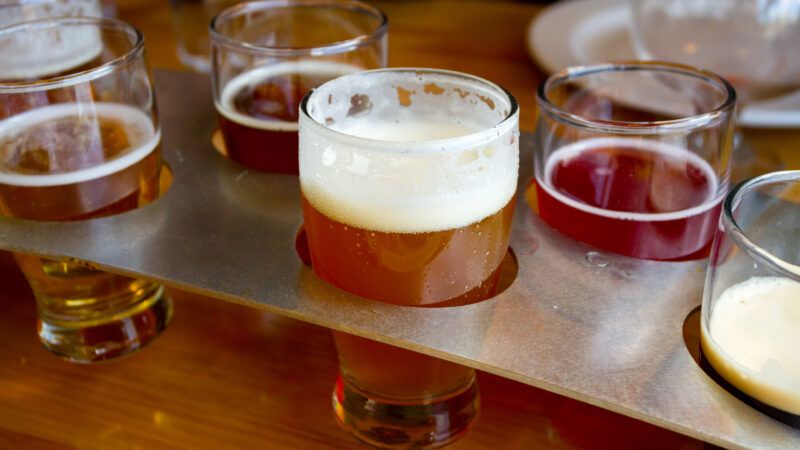New Jersey Cracks Down on Breweries for Hosting Trivia Nights, Serving Food
Regulations ban food sales, limit the number of events, and include other inane requirements.

Early in the COVID-19 pandemic, New Jersey refused to allow breweries to deliver their brews to people's houses, even though taprooms were forced to close on account of stay-at-home orders. Now, state regulators are primed to deliver the coup de grâce in their anti-beer campaign.
On July 1, the state's Division of Alcoholic Beverage Control (ABC) finally implemented its long-delayed, long-dreaded "special ruling" on craft breweries. First proposed in 2018, the rules caused an immediate firestorm in the local brewing community and were temporarily withdrawn. Re-introduced in 2019, the rules were scheduled to go into effect in 2020 but were suspended when COVID-19 hit.
The rules themselves are almost beyond parody. The headline restriction is that breweries will be limited to hosting a mere 25 on-premise "special events" per calendar year. What constitutes a special event? Pretty much anything you can imagine, so long as it's advertised and promoted, including beer yoga classes, trivia nights, or even a brewery deciding to broadcast a championship sporting event on its TVs.
If an event is not promoted or advertised, it apparently does not count against the 25-event cap, although it's unclear why a brewery would bother hosting weekly trivia if it can't tell its customer base when to show up.
Restricting such events puts a damper on potential on-premise taproom sales, undermining the brewery's ability to act as a community hub and gathering place. The event cap also disproportionately punishes the most vulnerable members of the state's brewing community, since many small microbreweries and nanobreweries exclusively sell beer from their on-premise taprooms, eschewing distribution to stores or bars altogether.
Breweries are also restricted to hosting 52 "private parties" per year, such as birthday parties or corporate events. But the New Jersey ABC makes clear that it will allow patrons attending a private party to bring their own beer and wine to the events. Why a brewery would want to host a party where someone else's beer is served goes unexplained. All events, whether they are a "special event" or a "private party," must be manually entered onto the DABC website at least 10 days in advance.
The rules add teeth to a previously implemented but rarely enforced requirement that breweries provide tours to all taproom guests before they sell them any beer. In another apparent effort to seem reasonable, the state regulator clarifies that the tour rule only requires one tour per year, per customer, meaning that frequent customers only have to go on one tour every 12 months—provided that the brewery keeps an updated list on hand of everyone who has recently completed a tour.
The rules also forbid breweries from selling food or hosting food trucks on-site. Breweries are barred from any attempts to "collaborate or coordinate" with food trucks, even if the trucks are parked off-site. Apparently the New Jersey ABC, which lists as its mission "foster[ing] moderation and responsibility in consumption of alcoholic beverages," wants New Jerseyans to consume their alcohol on an empty stomach. And just to make sure that it leaves no stone unturned, the new rules also prohibit breweries from making or selling coffee on-site.
All of these restrictions seem specially designed to punish breweries. Some restaurateurs and bar owners in New Jersey view the state's burgeoning craft brewing industry as a threat to their bottom lines and have therefore lobbied state regulators to severely curtail the taproom business of breweries.
Although such cronyist impulses may be hard to sympathize with, it is worth noting that Garden State restaurants suffer under their own needlessly punitive rules too. Namely, New Jersey has strict population quotas for liquor licenses, meaning that many restaurants are unable to obtain a license to sell alcohol at all. Those bars and restaurants that are able to obtain a license are oftentimes forced to cough up anywhere from a few hundred thousand dollars to over a million dollars to secure one.
Given the immense cost, restaurants and bar owners are incentivized to jealously guard these licenses and to limit competition from breweries, which only have to pay $1,250 annually for their licenses.
But the state has administered the wrong medicine for a disease of its own making. It has taken one bad government policy (restrictive population quotas for restaurant liquor licenses) and tried to address the unintended consequences of that policy by enacting yet more bad government policy (punitive new brewery regulations).
The state should instead scrap its new brewery rules and remove its longstanding liquor license quota. In other words, both brewery and restaurant alcohol licenses could cost around $1,250, which is closer to other neighboring states. If existing restaurant owners balk that they were forced to pay hundreds of thousands of dollars for a liquor license under the old regime, then the state can offer them a tax credit to compensate for the previous misbegotten government policy.
Whenever government creates a market inefficiency and hurts well-meaning businesses, it often pretends like the only answer is more government. New Jersey lawmakers should reverse this one-way government ratchet and deregulate the state's alcohol markets across the board.


Show Comments (36)